Molson Coors shrinks plastic packaging’s Beer Print
December 3, 2019
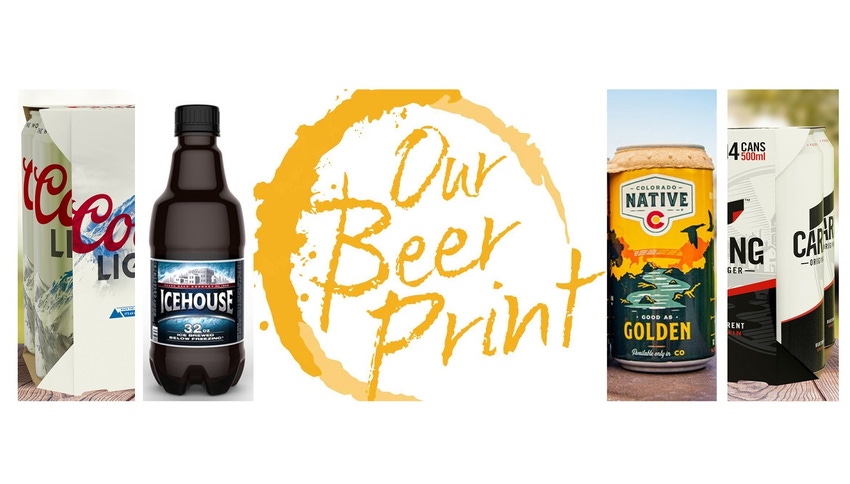
The brewer talks sustainable packaging strategies and tactics including 3-layer plastic bottles, paper sleeve cartons, fiber-based multipack rings and more.
Molson Coors Brewing Co. introduced in August a set of new global packaging goals to reduce plastics in its packaging, aiming for 100% of its packaging to be reusable, recyclable, compostable or biodegradable by 2025.
“As a global brewer with a strong family heritage, we have always taken seriously our responsibility to brew a more sustainable future,” said Molson Coors CEO Mark Hunter. “Plastic waste poses a clear environmental challenge, and as a consumer-packaged goods company, we play an important role in helping to solve the global waste crisis.”
The company’s new packaging strategy has four main goals:
Innovate: Make 100% of packaging reusable, recyclable, compostable or biodegradable. The strategy includes plans to move from a five-layer PET bottle to a three-layer bottle in the U.S. to enhance its recyclability.
Accelerate: Incorporate at least 30% recycled content in plastics packaging. While plastics comprise less than 2% of global packaging mix by weight, the company seeks to achieve at least 30% recycled content in its PET bottles, plastic film wrap and plastic rings.
Collaborate: Improve recycling infrastructure and support a better recycling system for communities, government and industries.
Climate: Reduce carbon emissions from packaging by 26%, which includes both internal changes and external partnerships.
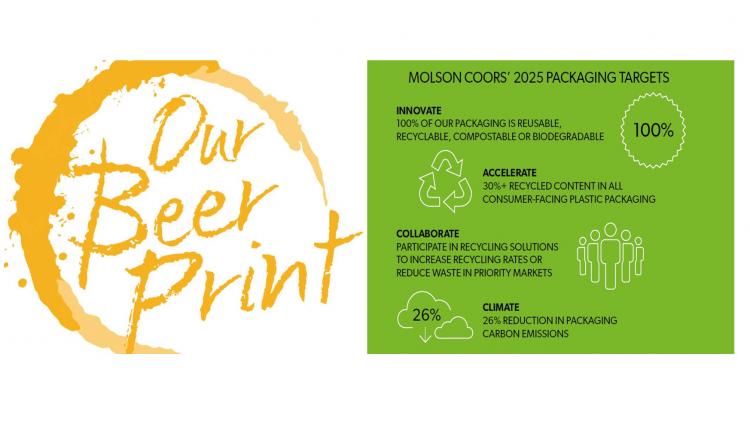
Managing the company’s entire sustainability program is Kim Marotta, global senior director of corporate responsibility, who points out that founder Bill Coors’ mantra of “waste is a resource out of place” has long been part of the company’s DNA. She’s well-suited for the heady task, having been hired in 2004 to develop a Corporate Social Responsibility strategy for Miller Brewing Co. during the MillerCoors U.S. years before being promoted to lead CSR globally at Molson Coors. “The purchase of MillerCoors by Molson Coors at the end of 2016 was a better opportunity to enhance our sustainability strategy including for packaging,” she says.
That lead in 2017 to the introduction of the “Beer Print 2025” strategy, the company’s vision for the environmental, social and economic space. “Beer Print is the notion that every time a beer is lifted up, there’s an imprint left behind,” Marotta explains. “We want to make sure it’s a positive one on our communities and environment.”
It also meant addressing internally the external outcry against a packaging material that is widely under siege, plastics.
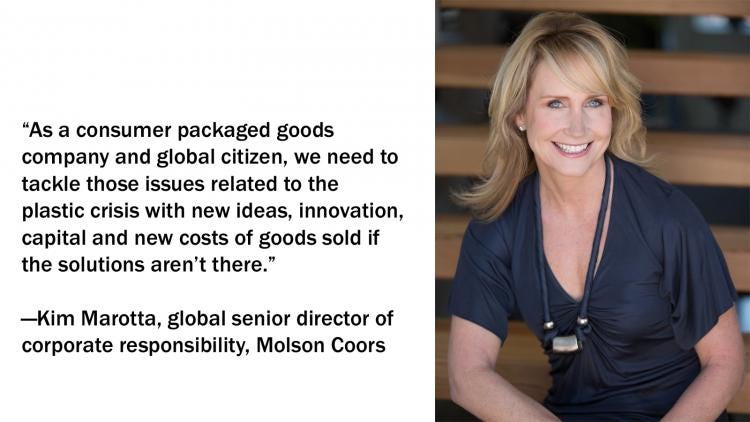
“There’s heavy pressure to eliminate the use of single-use plastics,” Marotta explains.“India was the first country to announce abandoning single-use plastics, which starts in 2020. Similar public sentiment and regulations are taking shape in the European Union that were soon followed by Canada as it moved faster toward abandoning plastics. San Francisco banned plastic bottles in their airport, and in many places plastic bags cost consumers extra.
“As a consumer packaged goods company and global citizen, we need to tackle those issues related to the plastic crisis with new ideas, innovation, capital and new costs of goods sold if the solutions aren’t there. We’re working with our suppliers to increase recycled content in our plastic rings and shrink wrap and in PET bottle—it’s all about what works for consumers in local markets. Some plastics will remain, while others will be switched for other materials. We’re coming at it from different angles and making a lot of progress.”
Among those promising angles that Marotta is most excited about is a development that she calls “a major breakthrough in plastic beer bottles.”
Next: A better-to-recycle PET bottle and shrinking shrink wrap use
___________________________________________________________________________________
In presenting the latest solutions in automation, food packaging, package design and more,
WestPack 2020 February 11-13 is co-located with several shows including PLASTEC West and offers the Cannabis Packaging Summit, all held at the Anaheim Convention Center. Register to attend today! ___________________________________________________________________________________

Currently the company uses a 5-layer oxygen barrier beer bottle in 32- (shown) and 40-oz sizes, but the shortcoming is that “in some municipalities those bottles are hard to sort and recycle,” Marotta acknowledges, which is why Molson Coors has given that packaging a lot of attention and now has good news to share.
“We’ve been working with our supply stream for several years looking at what new technology that will help us be sustainable, protect the quality of our beer and also help recycling in our communities,” says Marotta. “We’re excited to announce we are moving from 5-layer to 3-layer bottle in the U.S. that will help us to achieve our reusable, recyclable, compostable or biodegradable goal because the new bottle’s reduced nylon barrier layer that makes it much easier to recycle at a municipal recycling facility.”
The production of a 3-layer bottle requires a more precise barrier than that for the current-5-layer barrier bottle, Marotta points out, but the company’s R&D team determined that it’s possible through a new co-injection approach.
All that’s left is consumer testing to confirm the results they expect “and then we can continue moving forward with it,” she adds.
Paired with that new plastic bottle structure is the news that Molson Coors partnered with Loop Industries to reduce the reliance on virgin polymers through a chemical process that converts recycled PET into an rPET bottle with the same durability and quality as 100% virgin PET. Loop’s patented technology depolymerizes no- and low-value waste PET plastic and polyester fiber including plastic bottles, textiles and more into the base monomers. Those monomers are processed into Loop-branded PET resin and polyester fiber suitable for food-grade packaging.
“We’re really excited about that opportunity with Loop as a step toward a circular economy,” she enthuses.
And that’s just the start of things.

Mariotta appreciates that the fundamental challenge to any plastic reducing or elimination program is to replace plastic with an alternative than can perform as well. And one of those basic plastic packaging formats is shrink wrap used to bundle multipacks.
“Plastics’ appeal for a very long time has been for consumer friendliness and ease of use,” she admits. “We’re testing the paper-based alternative to learn about the interaction with consumers and what works in the U.S.”
That particular initiative comes under the Accelerate goal. Marotta discloses that before April 2021 Coors Beer will switch to 100% recyclable paperboard sleeves. “We made a commitment to remove plastic wrap by 2020 from large multipacks replacing with kraft paper, a new alternative that’s been in the market in UK with Coors Light and Carling.”
In the U.S., a pilot for one of the company’s craft brands, Colorado Native, is the first of the company’s brands to test a new plastic-free, fiber-based six-pack ring for beverage cans. The eco-friendly rings are made from post-industrial recycled fiber and are 100% bio-based, recyclable and compostable in commercial composting facilities.

It’s not a one-size fits all proposition.
“While we try for global solutions, consumers trends and needs and regulations are different by market and location,” she says. “We want to respond and address these needs appropriately.”
This past summer is early in testing phase.
“It’s a different look for the packaging, and it’s quite obvious to consumers with the switch from plastic to fiber that a change has been made.”
In November, Marotta shared the results with Packaging Digest: “The Colorado Native fiber rings are performing well, and we plan on converting 100% of our plastic rings to fiber on all of our Colorado Native beers.”
The company is also testing a bioplastic ring unitizer for cans.
Next: Carbon footprint reduction and more
___________________________________________________________________________________
In presenting the latest solutions in automation, food packaging, package design and more,
WestPack 2020 February 11-13 is co-located with several shows including PLASTEC West and offers the Cannabis Packaging Summit, all held at the Anaheim Convention Center. Register to attend today! ___________________________________________________________________________________
This year Molson Coors launched a new target to cut the carbon emissions from packaging by 26%, based on a 2016 baseline. At 26%, packaging is the largest source of carbon dioxide across the company’s value chain.
One venue to achieve that is for all 28 of the company’s brewing and major manufacturing facilities send zero waste to landfill by 2025. Marotta reports that during 2018 another three facilities achieved that target, bringing the company’s current total of zero-waste plants to 17.
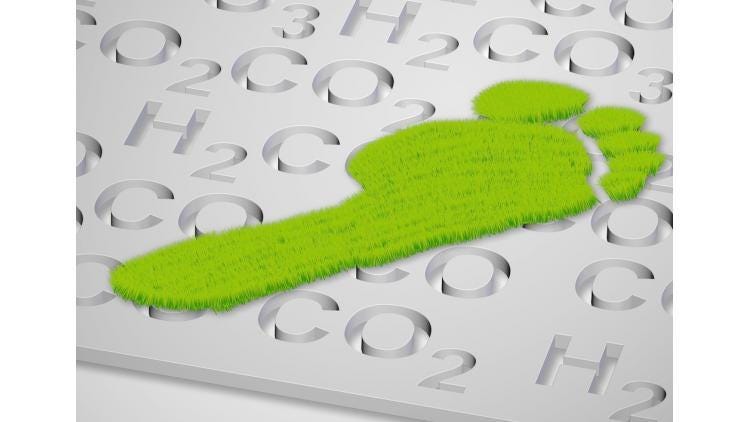
Other methods to lowering the carbon footprint is to increase the recycled content of glass and PET bottles and aluminum cans and to lightweight packaging.
As part of the packaging emission reductions program, the brewer held summits with its Top 100 global packaging suppliers to discuss new innovations, new technology and learn what the vendors were doing to reduce their own carbon footprint. For example, packaging suppliers Ball Corp. and Crown have committed to using 100% renewable electricity. “What they do affects Molson’s Value chain,” Marotta notes.
The company, which also operates one of the largest solar arrays in the U.S., is exploring carbon credit offsets as part of an aggressive goal with what Marotta calls a large “menu” of tactics to hit 50% emission reductions within its operations by 2025. These include energy- and self-sufficiency.
Molson Coors recognizes that for its and like programs by others to be regionally successful requires numerous participant stakeholders. In reaction, the brewer joined The Recycling Partnership, a group of 45 leading brands promoting more jobs in the circular economy, more material recovery and stronger, more equitable communities within the U.S.
Foundational to these and other efforts is grassroots participation by communities in reducing litter and collecting and increasing recycled content.
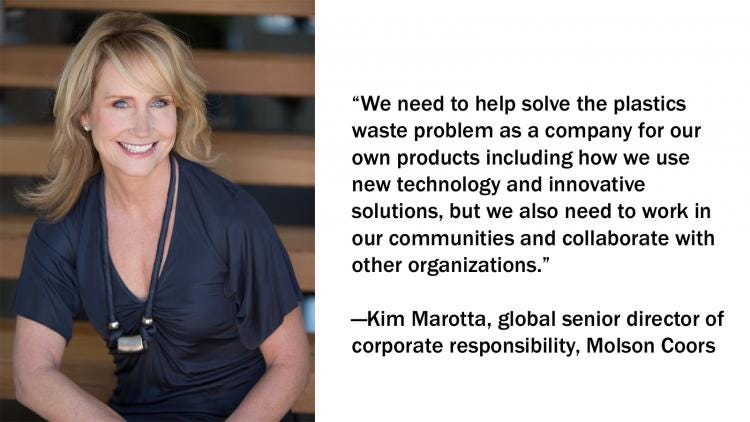
“We need to help solve the plastics waste problem as a company for our own products including how we use new technology and innovative solutions, but we also need to work in our communities and collaborate with other organizations—the government, nonprofit groups, and other key stakeholders,” Marotta explains. “We want to help take any confusion and obstacles to success out of recycling.”
And it’s not just for plastics packaging.
“We’re working in Denver with Momentum Recycling where glass recycling in municipalities is not a problem,” she says. “We have a joint venture with Rocky Mountain Bottling Company Recycle Colorado, an Owens-Illinois company, that recently over six months targeted places that were hard even for glass bottles to be recycled, like including apartments, bars and restaurants. We were successful to get the material to RMRC’s other locations so that recycled content could be made into new glass. Moving forward, we are looking at local solutions that focus on recycling infrastructure.”
For Molson Coors, the Beer Print 2025 plan is the current itinerary on a sustainable journey the company has traveled for decades.
“We have a foundation to work from—but there’s a lot more work for us to do as a company and for consumers to do in general,” says Marotta.
___________________________________________________________________________________
In presenting the latest solutions in automation, food packaging, package design and more,
WestPack 2020 February 11-13 is co-located with several shows including PLASTEC West and offers the Cannabis Packaging Summit, all held at the Anaheim Convention Center. Register to attend today! ___________________________________________________________________________________
You May Also Like


